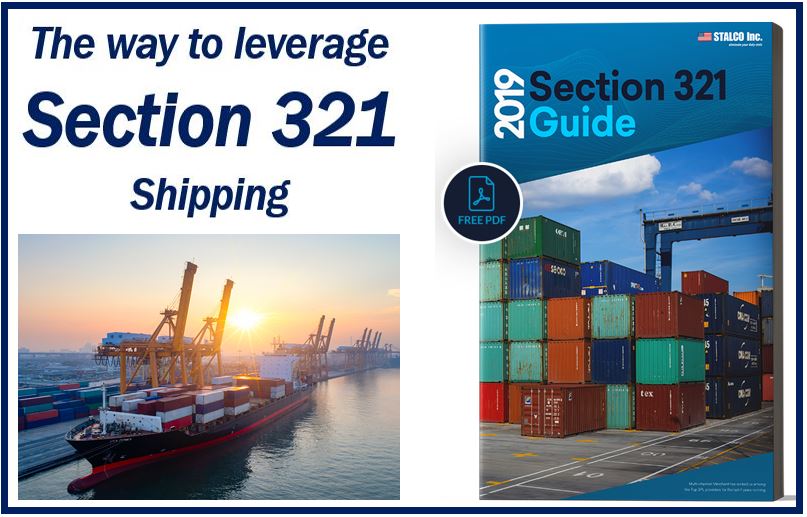“Section 321” is a special provision of United States shipping and customs law. Another name for it is “de minimis.” It is used to designate commercial goods that may enter the United States duty-free. Along with other conditions, it sets the value of the goods to be not more than $800. This is a new standard. The previous limit was $200 or less, which stood until February of 2014.

The new de minimis threshold for Section 321 shipping promotes more flexible international trade. The threshold was raised because of new developments in eCommerce. With the rise of Internet trade and international shipping, individual consumers create demand for small quantities of imported goods. Decades ago, importing goods was usually the domain of business, where now an end consumer can order international goods on a retail basis.
Not only does Section 321 remove duty fees from affected shipments, but it also streamlines the shipping process so that the border clearance process is expedited. This works out as a benefit to the governments on both sides, as it reduces paperwork and delays on trivial quantities of products.
Exceptions and exclusions to Section 321
Not all goods under $800 are automatically covered by section 321. Exceptions include:
- Products under regulation by another US government agency (USDA, FDA, CPSA, etc.)
- Products subject to Antidumping and Countervailing Duties (AD/CVD)
- Products subject to other duties not related to Section 321
- Products that automatically require an inspection as a condition of release
On the flip side, there are also exceptions to the above exceptions:
- Non-medical devices which emit radiation
- Samples of biological material for laboratory testing
- Cosmetics
- Dining and kitchen utensils
- Some foods (excluding some seafood and non-perishables)
For example, say we receive a case of facial skin cream valued at $600. Even if it happens to be made with CBD oil, which is regulated by the FDA, it can still be imported duty-free because it counts as a cosmetic. However, a case of CBD-oil oilpen cartridges (used for vaping) would be stopped by the FDA contingency.
Daily limit
In addition to the other provisions of Section 321, the restriction of shipping of goods under $800 applies per one package per on 24-hour period for business purposes. The cases of a private individual receiving goods for personal use, or a personal gift of goods traded between two individuals, does not apply.
For example, if a US citizen receives three ceramic tea sets from their uncle in China, and they’re all shipped separately at a value of $300 each, they are exempt from the daily limit. Or a US person on eBay may order three tea sets from a retailer in China at $300 each and receive them all in one day as long as they are shipped separately. But a retail store owner who is selling the tea sets may only bundle two together from their wholesale supplier in China, totaling $600 value, in one business day.
As stated in the US Customs and Border Patrol guidelines (pdf link), “Consolidated shipments addressed to one (ultimate) consignee shall be treated as one importation.”
Declaring a 321 shipment
Most of the time, no declaration of formal entry is required for goods valued at less than $800. If an eManifest applies, declaring a shipment to fall under Section 321 is done this way:
- Specify “section 321” in the eManifest filing
- Indicate goods quantity
- Fill in shipper, recipient, cash value, and country of origin
- submit it to the Customs & Border Patrol
The sender should have a control and management process to be sure that no more than one Section 321 shipments from them crosses the US border within a 24-hour period. Importers to the US must clearly identify the one item per day designated as Section 321 to avoid penalties. There is no limit on how many Section 321 shipments a recipient can receive in one day, as long as they are all from different senders. A shipper form outside the US may also take the measure of requesting formal entries on all other shipments that day, just to avoid confusion.
The main thrust of the raised de minimus duty-free limit is that it’s supposed to reduce the limitations and red tape on small, independent businesses and US buyers purchasing for their home use while keeping in place restrictions on higher-volume importers and larger businesses. Following new developments in international trade agreements and regulations is a prudent step for anyone in international eCommerce.
Video – Logistics
______________________________________________________
Interesting related article: “What is Shipping?“

